| dc.contributor.author | Fossheim, Hallvard | |
| dc.date.accessioned | 2021-06-22T12:41:04Z | |
| dc.date.available | 2021-06-22T12:41:04Z | |
| dc.date.created | 2020-06-25T11:26:11Z | |
| dc.date.issued | 2020 | |
| dc.identifier.isbn | 9780367366117 | |
| dc.identifier.uri | https://hdl.handle.net/11250/2760666 | |
| dc.description.abstract | In the Republic, Plato seems to advocate the banning of most extant poetry, because of its corrupting effect on the soul. A central claim in the next section will be that thumos as a specific module or capacity of the soul, as this is depicted in the Republic, is supposed to be trained to respond to what is kalon. The very notion of truth seems at times to be considered primarily in terms of impact with regard to the kalon. It is in this sense that “telling the greatest falsehood about the most important things make a fine story. Aristotle takes the artist’s activity and product to be kalon in being ideally suited to create a special form of cognitive experience in the spectator or reader. To very briefly recapitulate the philosophers’ paradigmatic art recipients, Plato’s audience is a mass of people, some of them very young, corrupted on a psychological level below the threshold of rational, even conscious processing. | en_US |
| dc.language.iso | eng | en_US |
| dc.publisher | Routledge | en_US |
| dc.relation.ispartof | The Poetics in its Aristotelian Context | |
| dc.title | To kalon and the experience of art | en_US |
| dc.type | Chapter | en_US |
| dc.description.version | acceptedVersion | en_US |
| dc.rights.holder | Copyright 2020 Routledge | en_US |
| cristin.ispublished | true | |
| cristin.fulltext | postprint | |
| cristin.qualitycode | 2 | |
| dc.identifier.cristin | 1817099 | |
| dc.source.pagenumber | 34-50 | en_US |
| dc.identifier.citation | In: Destrée, P., Heath, M., & Munteanu, D.L. (Eds.). (2020). The Poetics in its Aristotelian Context. 34-50 | en_US |
